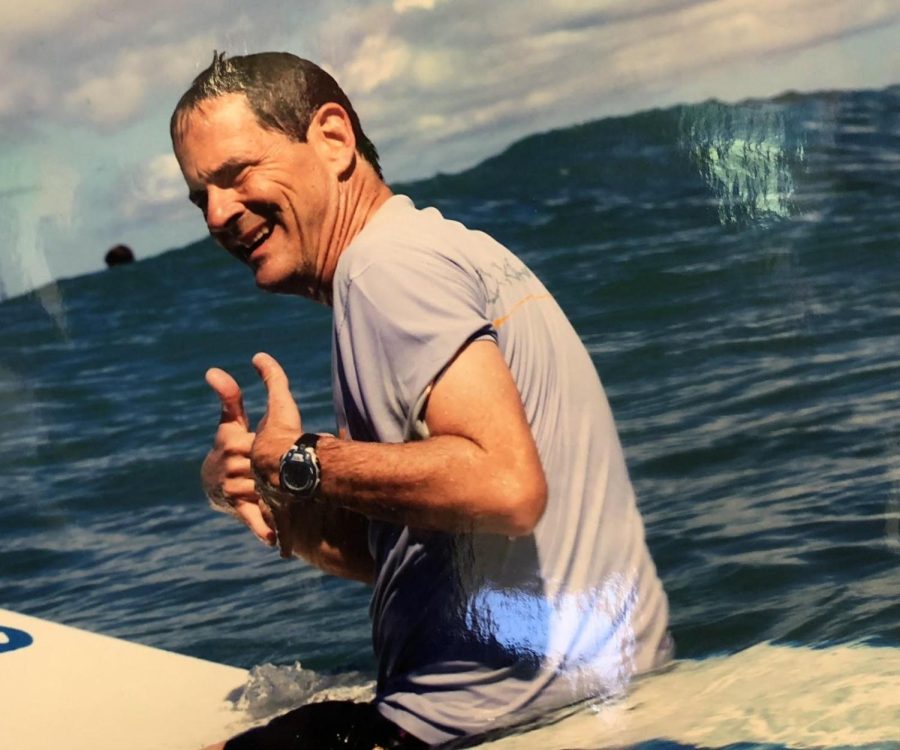From D.C. to Hollywood, Career Changers Bring Experience To Classroom
April 21, 2022
For many teachers at Lake Forest High School, teaching is a second career. The Forest Scout takes a look at what some of our favorite teachers did before they entered the classroom.
Mr. Peter Lubliner
Those of you who have taken Mr. Lubliner’s class will probably know about his previous career of being a screenwriter in Hollywood. However, his original ambition was to be an actor.
He discovered his talent for writing through a creative arts class he took at college, where he combined writing with his interests in acting and film. During his time in the industry, he learned a great deal and broke many expectations that he had. Stability is not a word Mr. Lubliner would use to describe the profession of a screenwriter.
“I got fired every Christmas for five straight years. Because, they cleaned up their books and that’s when they hired the new writers for the coming year on whatever given project it was. And then you sort of moved on and did the next one. There’s no shame in being fired in that industry. Everybody in the industry knows it’s going to happen. I’ve had people fire me and then hire me on another project the next day,” said Mr. Lubliner.
“Working at the studios was sometimes fun, too. If research needed to be done on a movie, the studio would provide a full screening room with food, cigars, and all that fancy stuff.”
Mr. Lubliner didn’t receive the artistic fulfillment from the film industry that he thought he would. It was a lot more corporate than he had realized, and overall, it valued profit over creativity.` After 13 years, he decided to start his own company, which focused on making high-end videos for companies. Half a decade later, he came to the realization that it still wasn’t fulfilling and that he wanted to be a teacher.
For those interested in entering the film industry, Mr. Lubliner advises that you know what you’re getting into. It’s difficult to be successful in the industry and most of it is owned by families that passed down the rights over generations. Skill and talent is not the only factor in determining success in the film industry. “Unless you make it big, careers are pretty short.”
Joseph Dudeck
Before teaching robotics, engineering, and CAD design, Mr. Dudeck was an engineer. He focused on large-scale transportation projects, specifically designing the hydraulic and drainage aspects of the roadway. This included retention ponds, detention ponds, dams, levees, large-scale detention pipe systems, and storm drains.
Mr. Dudeck was in North Carolina for most of his career and moved to Illinois as an engineer for five years. He started out working in a small engineering firm, which came with many benefits such as having Friday afternoons off and a relaxed work environment.
That completely changed when Dudeck moved to Illinois. The management was not respectful of his time and would consistently set unattainable deadlines, he said.
“Everybody was trying to step on everybody. Everybody was trying to throw each other under the bus, one up each other,” he said.
This resulted in him working unpaid overtime and constantly being stressed. Dudeck said it began affecting his life and the people around him, so he made the decision to quit his job as a professional engineer and become a teacher.
Mr. Dudeck initially applied for a position as a math teacher at LFHS, but he never got a call about it. However, he did receive a call offering him his current position. Mr. Dudeck loves his job as a teacher and said that his inspiration to become a teacher came from Joseph Cambell.
“Follow your bliss, that means you find something that you enjoy doing in your spare time, or that you would do anyway,” Dudeck said.
Laurie Hektor
Mrs. Hektor started her career at the American Association of Oral Maxillofacial Surgeons (AAOMS). She set up educational seminars all over the country, handling membership registration and audio/visual presentations.
After her work at AAOMS, she worked for a medical device company owned by Marmon Group. There, she was the Midwest Purchasing Manager, and her role was to obtain the raw materials needed to make the medical devices. She was promoted after a few years and was in charge of shutting down new companies that were bought.
After leaving Marmon Group, she said she found herself bored at home and decided to open the Uncle Mike’s chain of restaurants and bars in Kenosha, Wisconsin, with her husband. They sold the business right before the COVID-19 pandemic. After hiring managers, chefs, and various staff, she found herself home again and thought that she could be doing more.
An acquaintance of hers told her about an opening for a cashier position in the LFHS cafeteria, so applied and got the job.
Using her previous experience managing Uncle Mike’s, she opened The Grind coffee shop located next to the lunchroom.
Afterwards, Mrs. Hektor switched to the study hall supervisor position that we all know her for today.
“I love working with people. I love building relationships. I learned a lot about that,” Mrs. Hektor said.
Ms. Rachel Fisher
Ms. Fisher is a relatively new face around LFHS. She is currently a student teacher for Mr. Covey’s PSG and Ms. Schwartz’s Calculus AB classes. She studied material science and engineering in college, and then worked as an engineer for the Department of Defense (DoD) and as a contractor for the Science Applications International Corporation (SAIC) for 10 years.
Ms. Fisher’s work at the DoD consisted of operational tests and evaluation for equipment, electronics, and hardware. One example of her work was testing torpedoes for the Navy.
“One particular test I remember, I was stationed outside of Seattle, in Keyport, Washington, and we flew to the coast of Hawaii to do a test there, and I specifically remember being in this pineapple field on the coast of Hawaii testing torpedoes,” Ms. Fisher said.
She tested equipment all across the country in places such as Panama City, FL, Hawaii, California, Virginia, Washington.
“It was really to just collect data and then report this is what worked and this is what didn’t work. Now, it was up to someone else to decide how to fix it,”Ms. Fisher said.“I always really liked science, pre-college, and I thought what I wanted to do was some kind of application of science. So I thought engineering was a natural fit, in particular, I liked chemistry a lot, and material science and engineering, which is what I studied, is kinda a perfect application of chemistry and also physics together.”
Ms. Fisher also started a business to tutor math and realized that she liked working with high school students. She felt communication was something that she was able to use a lot in her career as an engineer, she said.
“I’m always a fan of when students want to go into engineering because I think it’s a highly employable major. I have a lot of friends who were engineering undergrads who did become engineers, but they were able to be hired in all kinds of fields because employers really appreciated their ability to problem solve and to be creative, and that’s a really important skill to have in any field,” Ms. Fisher said.
Mr. Andre Yavetsky
Mr. Yavetsky has been teaching Spanish at LFHS since 1997. He speaks English, Russian, Spanish, and Portuguese. He began attending Moscow State University (MSU) in 1981 with the intent to become a translator or interpreter for diplomatic purposes, such as for the UN. In his third year, Mr. Yavetsky traveled to Cuba to translate a speech for the Cuban Minister of Education. At MSU, Mr. Yavetsky received a diverse set of military training, including strategies, firearms & weapons, and a general knowledge of military equipment. After graduation, he was awarded the rank of Lieutenant.
Mr. Yavetsky graduated with a degree in civilian translations, which focused on being a translator and interpreter, and another degree in military translations, which focused on accurately translating military information.
One of Mr. Yavetsky’s first missions was in the West-African country of Guinea-Bissau. He was tasked to bridge communication between the Soviet and local armies. The official language in Guinea-Bissau is Portuguese, which he learned in just a few months because of its similarity to Spanish.
After his work in the Soviet Army, Mr. Yavetsky got a job translating Russian books into Spanish. He said translating page by page for hours on end was tedious, so he began looking for a better job not long after starting.
Mr. Yavetsky then landed a job at the Spanish newspaper, El Independiente.
“That was a fun, fun, fun job. I was basically interviewing important politicians in Moscow—interviewing meaning I was translating the questions from Spanish to Russian and translating the responses from Russian to Spanish,” Mr. Yavestky said.
“It was 1990. I was thinking, what skills do I have to apply myself in the United States? The only skill was languages, and I was lucky to have expertise in Spanish and knowing English pretty well,” said Mr. Yavetsky. His first job in the US was teaching Spanish and Russian at DePaul University. He wasn’t sure if he would like it at first, but by the end of the year, he took on additional courses and happened to like it.
One day, Mr. Yavetsky was informed by a friend at DePaul that he didn’t have proper medical insurance, which came to his surprise as he was not aware that such a thing was needed, since he was used to a government healthcare system like the one in the Soviet Union. Since he was working part-time at DePaul, he wasn’t eligible for any solid benefits, so he began looking for alternatives.
After DePaul, Mr. Yavetsky got a full-time job teaching Spanish at St. Benedict High School, and taught there from 1991 to 1997. He worked to get his teaching license while working at St. Benedict.
Mr. Yavetsky was trained in two types of translation. One was simultaneous translation, which is translation while somebody is speaking. Simultaneous translators translate what is being said with a two word delay, so concentration on what is being said and what you are saying is key.
The second type was consecutive translation, which is where somebody says a sentence, stops, and then the translator repeats the same sentence in the target language. Simultaneous translation requires good equipment, so it’s typically reserved for higher-level events such as UN conferences.
“The Spanish language actually saved my life in America because now I’ve been working in awesome places like this thanks to my language (skills), which is pretty unique. If I had some other language, I don’t know what I would do. I would probably have to switch my career completely.”, said Mr. Yavetsky.
“My friends, who got a job at the United Nations, they still work in the United Nations, like in New York and Geneva. And I have to say, they complain a lot about that monotonous, boring type of day that they have, because they have to look at the computer, most of them are written translators.” “Most of them got a job at the United Nations as a translator, they are basically sitting at a screen, every day, for eight hours, and they translate those very boring, very dry, texts, and they go nuts. But I’m having fun, and money wise, it’s not even that different. They all live in New York, and maybe they make a bit more money, but they have to live in New York, it’s an expensive place. Or in Geneva, Switzerland.”, said Mr. Yavetsky.







